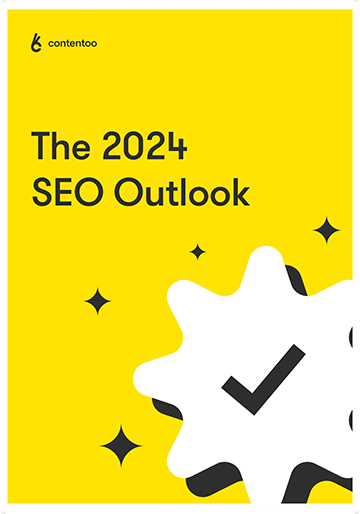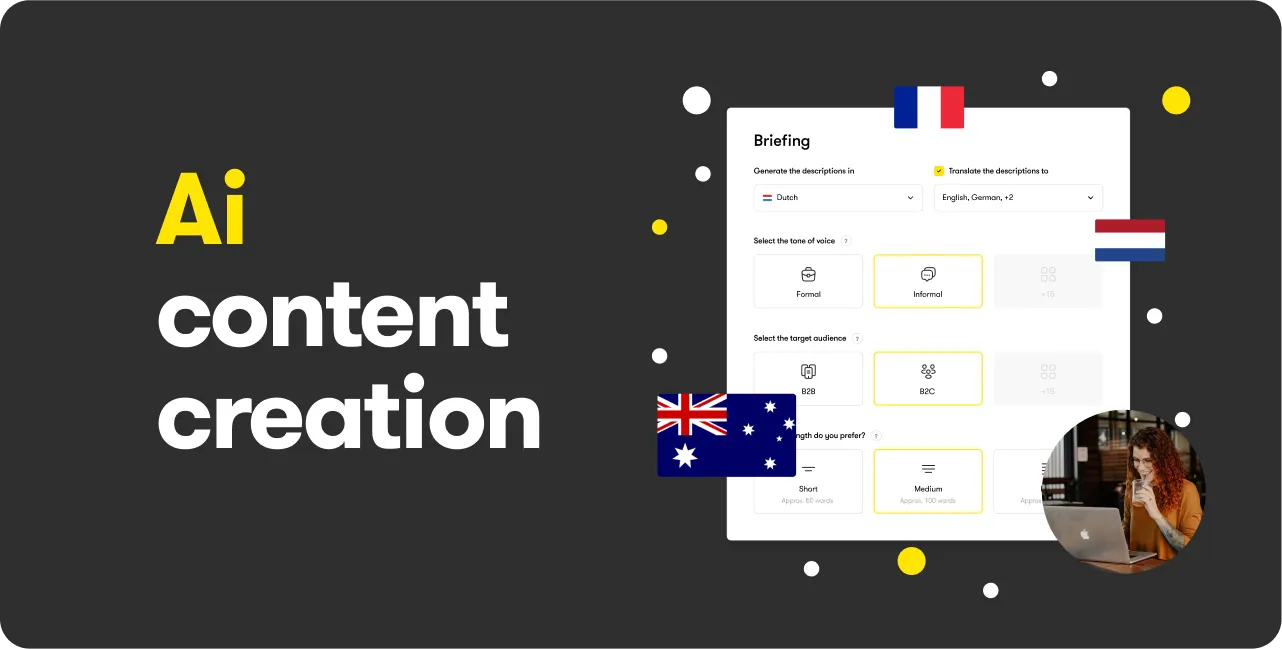In short
Artificial Intelligence (AI) is a powerful tool that augments human capabilities, streamlining processes, and making them more efficient. In this blog, we will shine a light on the most effective AI use cases. AI takes on the heavy lifting of data analysis, freeing marketers to focus on strategic decision-making and creative tasks.
The key is finding the perfect balance between human intelligence and AI to create compelling content that resonates with your audience. AI tools go beyond automating tasks; they enhance the quality of your content marketing efforts, helping you create more relevant, personalised content that speaks directly to your audience’s needs and interests.
It’s not just about improving data quality; it’s about empowering brands to make more informed decisions. By ensuring data accuracy and completeness, AI can help brands execute precise targeting and segmentation strategies. This helps turn data into actionable insights that can drive your content marketing strategy forward.
For some, AI might seem like the holy grail. For others, it could spell the end of days. The truth is — it’s a radical innovation that will change work but cannot be used in every scenario.
With a middle-of-the-road approach, brands can leverage the transformative potential of this technology while staying mindful of its risks and limitations. There’s no need to evangelise or boycott AI tools. Rather, brands can carefully and strategically onboard them, gaining a competitive advantage in the ever-evolving landscape of content marketing.
The 10 most impactful AI use cases for content marketing
Our industry experts have identified some of the most effective AI use cases, ones that go beyond content creation. From attribution to data quality improvement, there are several intriguing AI applications that will shake things up in the world of content marketing.
1. Attribution
In order to effectively optimise campaigns and allocate resources, brands require deep insights into which channels and touchpoints contribute most to conversions. This is where AI-powered attribution models come in.
By analysing vast amounts of data, AI algorithms can accurately attribute conversions to specific marketing activities, enabling brands to make data-driven decisions and maximise ROI.
AI attribution models use advanced machine learning techniques to process and analyse data from various sources. They can handle complex customer journeys that span across multiple channels and touchpoints. This allows for a more holistic view of the customer journey, helping brands to understand the impact of each interaction on the final conversion.
2. Churn prediction
In order to gauge customer retention, brands can use AI algorithms to analyse historical data and customer behaviour patterns. These models can consider a wide range of factors, including usage patterns, and customer feedback, and changes in behaviour over time.
By identifying potential churners in advance, brands can proactively implement targeted retention strategies, such as personalised offers or tailored communication. In doing so, it is possible to retain valuable customers and minimise churn rates.

3. Hyper-personalisation
With the power of AI, brands can deliver highly personalised experiences at scale. By leveraging machine learning algorithms, you can analyse vast amounts of customer data, including browsing behaviour, purchase history, and demographic information.
AI-powered hyper-personalisation goes beyond simple segmentation. It uses advanced machine learning algorithms to understand individual customer preferences and behaviours at a granular level.
With this, it’s possible to create tailored marketing messages and offers that resonate with each individual customer. Overall, hyper-personalisation increases customer engagement, improves conversion rates, and fosters long-term customer loyalty.
4. Advertisement optimisation
AI algorithms for ad optimisation use machine learning to learn and improve continuously.
When brands onboard AI, they are better positioned to optimise their advertising campaigns. This takes place when the process of selecting target audiences, ad placements, and ad creatives is automated.
When campaign performance is analysed and optimised in real-time, AI algorithms can maximise ad effectiveness. Such a scenario helps ensure that marketing budgets are allocated to the most impactful channels and strategies.
5. Sentiment analysis
AI-powered sentiment analysis tools use natural language processing (NLP) techniques to understand the sentiment behind text data. Understanding customer sentiment is vital for effective brand management and reputation monitoring.
AI-powered sentiment analysis tools can analyse customer feedback, social media posts, and online reviews to gauge customer sentiment towards a brand, product, or campaign. By monitoring said sentiment in real-time, brands can quickly address concerns, identify trends, and tailor their messaging to align with customer expectations.

6. Empathetic chatbots
Chatbots have become an integral part of customer support and engagement strategies, they can understand the context of the conversation, provide relevant responses, and learn from each interaction to improve over time.
AI-powered chatbots equipped with natural language processing capabilities can provide personalised and empathetic interactions with customers. These chatbots can understand and respond to customer queries, offer product recommendations, and provide support 24/7. Altogether, these activities enhance the customer experience and improve customer satisfaction.
7. Real-time pricing optimisation
When pricing optimisation algorithms are driven by AI, they can analyse market dynamics, customer behaviour, and competitor pricing data in real-time. By dynamically adjusting prices based on demand, seasonality, and competitive landscape, brands can maximise revenue and profit margins while maintaining market competitiveness.
Moreover, AI-driven pricing optimisation can also provide valuable insights into customer price sensitivity and purchasing behaviour.
By analysing how customers respond to different price points and adjustments, brands can gain a more profound understanding of their customer’s preferences and willingness to pay. This can inform not only pricing strategies, but also product development, marketing, and sales strategies.
8. Micro-influencer discovery
It can be time-consuming for brands to identify the right influencers. This is where AI-powered tools come in handy — capable of analysing social media data and audience engagement metrics. They can analyse factors such as follower count, engagement rate, and the relevance of the influencer’s content to the brand’s target audience.
In doing so, these tools can discover micro-influencers who have relevant and engaged audiences within specific niches. As well, brands can forge authentic partnerships with influencers that resonate with their target audience, resulting in more impactful marketing campaigns.

9. A/B testing
A/B testing is a tried and trusted method for optimising marketing campaigns. Providing valuable insights into what resonates with audiences and what doesn’t. However, the advent of AI has taken this process to a whole new level.
AI algorithms can streamline and automate the A/B testing process, allowing brands to test multiple variables simultaneously and gather actionable insights faster. This speed is crucial in today’s fast-paced digital marketing landscape, where trends can change in the blink of an eye.
The quicker you can gather and act on these insights, the better your chances of staying ahead of the competition. But the benefits of AI in A/B testing don’t stop at efficiency and speed. Using AI, you can make data-driven decisions to improve conversion rates, click-through rates, and overall campaign performance.
10. Data quality improvement
High-quality data is the backbone of successful marketing strategies. AI can help brands clean, validate, and enrich their data sets by identifying and correcting errors, removing duplicates, and filling in missing information.
By ensuring data accuracy and completeness, AI-powered data quality improvement tools empower brands to make informed decisions and execute precise targeting and segmentation strategies.
Furthermore, AI-driven data quality improvement can also support predictive analytics. By providing high-quality, clean data, AI can enhance the accuracy of predictive models, enabling brands to anticipate customer behaviour and market trends. This can inform strategic decision-making and enable brands to proactively respond to changes in the market.
Conclusion
Artificial Intelligence is not just a buzzword in the world of content marketing; it’s a powerful tool that can transform the way brands engage with their customers. From attribution to data quality improvement, AI offers a myriad of applications that can help brands gain a competitive edge in the market.
However, it’s important to remember that AI is not a magic bullet that can solve all problems. It’s a tool that needs to be used strategically and thoughtfully. Brands need to understand the capabilities and limitations of AI, and how it can best be applied to their specific needs and challenges.
While AI can automate many tasks and processes, it cannot replace the human touch. Brands must strike a balance between automation and personalisation, using AI to enhance, not replace, human interaction. AI holds immense potential for content marketing. But like any tool, its effectiveness depends on how well it’s used. Brands that can harness the power of AI while staying mindful of its limitations will be the ones that thrive in the ever-evolving landscape of content marketing.
As we move forward, it’s clear that AI will continue to play a pivotal role in shaping the future of content marketing. Brands that can adapt and evolve with this technology will be well-positioned to succeed in this exciting new era.




